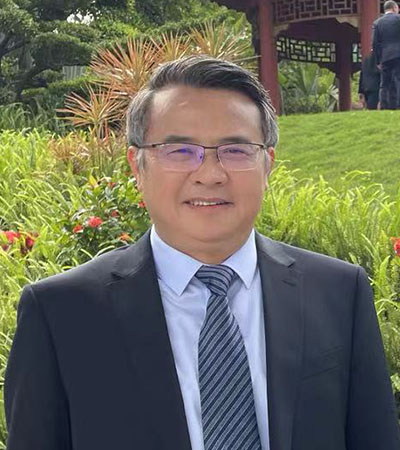Zhigang Shuai

Born August 27, 1962 in Jiangxi, China
X. Q. Deng Presidential Chair Professor, The Chinese University of Hong Kong, Shenzhen, and Changjiang Scholar Chair Professor, Tsinghua University, Beijing, China
Email:shuaizhigang@cuhk.edu.cn
WWW: external link
Outstanding Young Scientist Award of the National Natural Science Foundation of China (2004); National “Bai-Qian-Wan” Talent Program Award (2006); IAQMS Member (2008); Changjiang Scholar Chair Professor (2008); Fellow of the Royal Society of Chemistry (2009); Foreign Member of the Academia Europaea (2011); Chinese Chemical Society - AkzoNobel Chemical Sciences Award (2012); Foreign Member of the Royal Academy of Belgium (2013); National Merit Scientist Award (2014); WATOC Scientific Board Member (2017); Prix Franco-Chinois of the French Chemical Society (2018); Beijing Natural Science Prize (First Class), 2020;
Chairman of the Theoretical Chemistry Committee of the Chinese Chemical Society (2015-2018); Executive Board Member of the International Union of Pure and Applied Chemistry (2022-2025); Vice-President of the Chinese Chemical Society (2019-2026);
Associate Editor of “Acta Chimica Sinica” (2012-); Deputy Editor of “Research – A Science Partner Journal”; Editorial/Advisory Board Member of: National Science Review, Chemical Physics Letters, ChemPhysChem, WIRES Comput Mol Sci, Theoretical Chemistry Accounts, Advanced Theory & Simulation, Nanoscale, J Mater Chem C, Synthetic Metals.
Author of:
“MOMAP” – a commercialized software for predicting physical properties of molecular materials (http://www.momap.net.cn). “Theoretical Chemistry: Principle and Application”, Eds: Zhigang Shuai and Jiushu Shao (Science China Press, Beijing, 2008). “Theory of Charge Transport in Carbon Electronic Materials”, Zhigang Shuai, Linjun Wang, and Chenchen Song (Springer, Heidelberg, 2012). “Theory, Modeling and Simulation of Nanostructures and Functions”, Eds.: Zhigang Shuai and Ke Xia (China Science Press, Beijing, 2012). “Theory and Computation for Organic Opto-Electronic Materials”, Ed. Zhigang Shuai, (Science China Press, Beijing, 2020). “Density Matrix Renormalization Group (DMRG)-based Approaches in Computational Chemistry”, Haibo Ma, Ulrich Schollwöch, Zhigang Shuai (Elsevier, Amsterdam, 2022).
Plus over 460 articles in theoretical, physical, and materials chemistry.
Important Contributions:
Theory promises brighter polymer light-emitting-diodes through novel insight into the spin-dependent exciton dynamics for the electroluminescence; Development of quantum chemistry density matrix renormalization group theory and its time-dependent formalism: application to the excited states electronic structures, spectroscopies, carrier transport, and thermoelectric conversion for semiconducting polymers and molecular aggregates; Quantum nuclear tunneling model for carrier transport in organic/polymeric materials; Vibration correlation function formalism for excited state decay and quantitative prediction of molecular light-emitting quantum efficiency and theoretical interpretations of the exotic aggregation induced emission and mechanism of organic room temperature phosphorescence.


